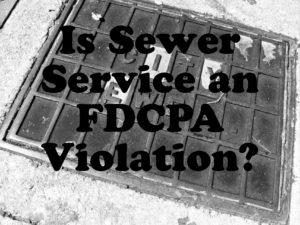By: Robert J. Nahoum
THE PROBLEM
The cashier at the grocery store rings you up, you swipe your debit card and embarrassingly, the cashier tells you that your card is no good. You call your bank and are told that your bank account has been frozen. How can this have happened? Turns out, you were sued by a debt collector, you didn’t answer the lawsuit, and a default judgment was entered against you.
The reason you didn’t know about the default judgment is because the court papers were never served on you. Nevertheless, an affidavit was submitted to the court by the debt collector claiming that that you were served.
“Sewer service†is the practice common in debt collection cases where, a process server hired by a debt collection attorney, knowingly and deliberately fails to serve debt collection lawsuits against consumer defendants while submitting fraudulent affidavits to the court claiming service was made.  Judgments obtained through sewer service can be easily overturned by filing an order to show cause to vacate the default judgment.
However, in many ways, the damage has already been done. Even if the judgment is vacated, you might have already suffered the embarrassment of a wage garnishment or been charged unnecessary fees by your bank for the frozen account. Is this legal? Is there something you can do to be compensated?
THE RULES
Federal debt collection laws, known as the Fair Debt Collection Practices Act (FDCPA for short), regulates the conduct of third party debt collectors. The FDCPA generally prohibits debt collectors from using abusive debt collection tactics that are false, misleading and harassing.
If a debt collector violates the FDCPA, you can sue for statutory damages up to $1,000.00, actual damages (like pain and suffering) and the debt collector may have to pay for your attorney. The FDCPA gives consumers the power to swing the pendulum in the other direction and sue the debt collector for violating your rights as a consumer.
In sewer service cases, debt collectors routinely make the argument that process servers are independent contractors over which the debt collectors and their attorneys have no control. The courts have typically sided with the debt collectors on this argument. So, to make out an FDCPA claim for sewer service, it must be shown that the debt collector or the debt collection lawyer knowingly employed a process server that deliberately failed to properly serve debt collection lawsuits against consumer defendants. Without evidence of the debt collector’s knowledge of sewer service, courts will not impose liability for the misconduct of process servers.
WHAT YOU SHOULD DO
If you’ve been the victim of sewer service, call an experienced consumer protection attorney to see if you have a claim against the debt collector or its attorney for violating the protections of the FDCPA.  If you do have an FDCPA claim, you can sue for statutory damages up to $1,000.00, actual damages (like pain and suffering) and attorneys’ fees.
If you need help settling or defending a debt collection law suit, stopping harassing debt collectors or suing a debt collector, contact us today to see what we can do for you. With office located in the Bronx, Brooklyn and Rockland County, the Law Offices of Robert J. Nahoum defends consumers in debt collection cases throughout the Tristate area including New Jersey.
The Law Offices of Robert J. Nahoum, P.C
(845) 232-0202
www.nahoumlaw.com
info@nahoumlaw.com

